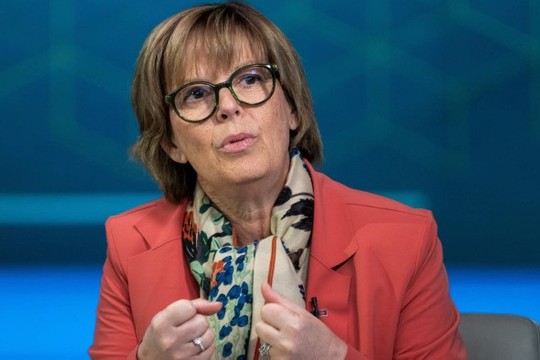Valérie Urbain: ‘If you increase the revenues, you increase the risks. And so who is bearing that risk?’
Photo: Bloomberg
The EU’s plan to raise more money for Ukraine by putting frozen Russian state funds into riskier investments would amount to “expropriation”, the institution holding the bulk of the assets has warned.
Euroclear chief executive Valérie Urbain told ‘The Financial Times” that plans to reinvest cash generated by the assets to yield higher profits could risk further retaliation from Moscow, and undermine the central securities depository’s key position in the financial system.
“If you increase the revenues, you increase the risks. And so who is bearing that risk?” Urbain said in an interview.
The European Commission is considering how to extract more value from some €191bn in Russian central bank assets stuck at Euroclear because of western sanctions. Euroclear is reinvesting the cash arising from Russia’s maturing assets — such as coupon payments and redemptions — mainly through central banks. The G7 is using the returns to back a $50bn loan to Kyiv.
Profits from the assets have been declining as the European Central Bank lowered its interest rate. That has prompted the commission to propose shifting the cash into riskier asset classes that might generate higher yields, but also carry a greater risk of losses.
Urbain warned someone would have to cover such potential losses.
“The systemic risk would certainly dramatically increase if we would have to go beyond the risk profile that we have and which is authorised by our supervisors,” she said.
Last year, Euroclear paid €4bn to Ukraine, and has paid out €1.8bn this year, Urbain said.
She added the EU’s plans to increase those amounts could involve creating a “special purpose vehicle” to which the Russian central bank assets would be transferred. The SPV would be able to channel the cash generated from the assets into riskier investments and “hopefully, by taking more risks, bring more revenues”.
But Urbain warned at the same time that such a scheme would create “a lot of risks for Euroclear and for the European markets globally”.
“Legally speaking, the creation of an SPV would mean an expropriation of the cash from Euroclear” without freeing it from the liability of restitution against the central bank of Russia, she said, adding that this would result “clearly [in] a position that we cannot bear”.
Discussions around the seizure of Russia’s central bank assets have ebbed and flowed since about €260bn were frozen in different jurisdictions in the wake of Moscow’s full-scale invasion of Ukraine in February 2022, but the legal and financial risks of confiscation have always prevailed.
Euroclear faces more than 100 lawsuits over immobilised Russian assets, including those belonging to oligarchs and other sanctioned entities. According to people close to Euroclear, Russia has confiscated €33bn in assets belonging to Euroclear clients that had been immobilised at Euroclear’s Russian counterpart, the central securities depository in Moscow.
Euroclear, with more than €40tn assets in custody, is Europe’s largest central securities depository — a key node of the financial market facilitating and settling trades by holding and transferring assets.
“We should also certainly expect more Russian retaliation in all sorts of forms,” Urbain said.
read more in our Telegram-channel https://t.me/The_International_Affairs

 10:23 19.07.2025 •
10:23 19.07.2025 •























